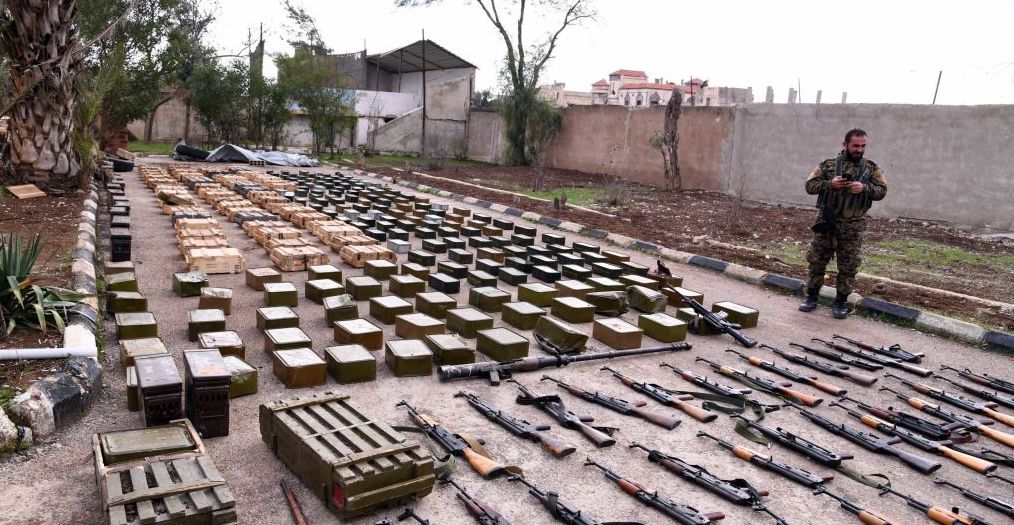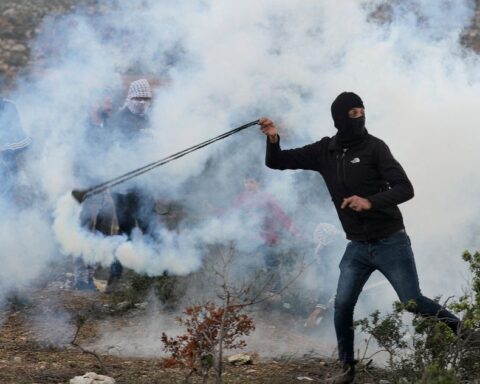Three refugees are arguing the UAE funded war crimes by ISIS terrorists in the Syrian civil war in a landmark case in British legal history.
The men, who are from Syria but are now asylum seekers in the UK, claim Arab officials financed human rights abuses in the war-torn country in 2015.
They said they saw severe torture, vicious beatings and property destruction committed by jihadists they say were armed by the Gulf state.
One claimant testified ‘the smell of corpses and death spread in my beloved town, and there was no life left in it’.
The three are pursuing legal action against the UAE through the High Court in England.
The claim would be the first of its kind as they seek to blow apart the use of the sovereign immunity defence in cases involving human rights abuses, such as torture.
If successful, it would open the floodgates for people to hold foreign state sponsors of militant and terror groups to account through UK courts.
The Syrian civil war is an ongoing conflict over the past decade that has seen at least 387,118 killed.
A further 205,300 people are either missing or presumed dead, with 88,000 of these believed to have died of torture by the regime.
The Syrian government is believed to be behind about 156,329 of those killed, while Islamic State is understood to have slaughtered 13,996 during its brutal campaign.
The UAE entered the fray in 2014 with the US-led coalition against ISIL but later broke off to join the Russian intervention in the civil war in 2015.
The London-based refugees – Mohamad Damen Alsulaiman, Ahmad Sharaf and Mohamed al Saeid – got their lawyers to launch a pre-action protocol against the UAE, paving the way for court proceedings.
In it they accused the country of funding jihadists during the chaotic Syrian civil war in 2015 and claimed they saw UAE-made weapons, equipment and aid packages.
Mr Alsulaiman, a builder and construction worker from Nabe’ al-Sakhr, a 1,800-strong dwelling in the Quneitra Governorate, said the area became a hotbed for jihadist activity in 2014.
He said: ‘All groups committed crimes, damages, bombing, torture and killing. They are all armed militias.
‘They were abusive to people and wanted to turn our society into total conservative regime.
‘They tortured and killed many people; they refused our style of life which is liberal compared to theirs. They wanted us to convert to their radical ideology.’
He added: ‘I witnessed all types of human rights violations such as bombing, fighting, killing and arrest.
‘It was horrifying experience that created trauma for me. Some friends and relatives where either killed, arrested, or tortured from these groups.’
He said terrorists were wandering around with guns called CAR 816 or Caracal Sultan, which are similar to M16s but used by the UAE.
Mr Alsulaiman claimed some of them had been gifted personal weapons called Caracal pistols, which also hail from the Arab state.
He also said one of his family bought food from the market which was wrapped in an Emirate flag, which he claims shows UAE involvement on the militants’ side.
He added that the relative told him they were three long-life meals sold by jihadi fighters.
Mr Sharaf, from Nawaa in Daraa Governorate, who had been at school while in Syria, said ISIS and other jihadists took over the area in 2015.
He said: ‘I do not know the difference between those groups. There were many groups with Islamic names and slogans. They had different flags and agendas.
‘ISIS killed, kidnapped, tortured, arrested, burned people who oppose them from any group, and who are not following their ideology such as singers, artists, painters, and musicians and who refuse to do whatever they asked them to do.
‘They torture and whip people in the middle of the famous squares. Sometimes, they used to kill people who just go out of their houses.
‘They used to show things in public to terrorise other people. They did this to me personally when they invaded my house and beat me and arrested me.’
Mr Sharaf said he was detained by ISIS while they controlled the area with up to seven other people for about two weeks.
He said: ‘They beat randomly, just hard beat every day. They were face masked and sometimes we were blindfolded.
‘They were using religious language and texts to justify their behaviour.’
On the UAE’s alleged involvement, he said: ‘Sometimes we could hear the fighters speak in their Arabic standard dialect which is different from Syrian dialect about the delayed money and salaries and sometimes about aid and food packages from Emirati red crescent through abu Qotada, an ISIS Jihadi Fighter, who come on weekly basis to their headquarters on the borders of my town.
‘They always talked about ‘the Abu Dhabi Sheikh’ (another one not Abu Qotada) which will come again.
‘I understood from what they said that there was a man who is in charge of supervising their work and paying their salaries.
He claimed his family saw fighters giving aid to people as well as food packages along with flyers saying ‘a gift from emirate people’.
He said he escaped from prison by bargaining with one of the guards and saying he had money stashed away he could hand over.
He said it worked and he fled the area by paying huge sums to people smuggling gangs.
Meanwhile Mohamed al Saeid, from Umm Batinah, a 1,500-strong dwelling in the Quneitra governorate, said when ISIS took over his town they came with had Red Crescent food parcels.
But he admitted he has no further proof of UAE involvement with terrorists other than media reports.
The three men were forced to flee Syria before their villages fell to insurgents following bombings by the Asaad regime in 2015.
They escaped via Turkey, Jordan, and Lebanon before finally being given refuge in Britain.
Their letter to the UAE, which they also sent to the Foreign Office, has had no response from the Gulf state after two weeks, lawyers representing them said.
They told their legal team Ai Law to prepare papers for a case in the High Court to strike down the sovereign immunity defence for alleged human rights abuse cases.
The solicitors will argue it is impossible to hold foreign states to account for allegedly violations due to the defence – in the first suit of its kind in the High Court.
The move could pave the way for the trial of sovereign governments over allegations of human rights abuses.
The Foreign Office issued a ‘disappointing’ response to the letter, saying: ‘Thank you for your letter of 15 September to the Foreign Secretary in which you enclosed for information a copy of a letter Ai Law has written to the United Arab Emirates Ambassador on behalf of its clients.
‘Your letter has been passed to the Iraq and Arabian Peninsula Department for a reply.
‘The FCDO has noted this correspondence between Ai Law and the Embassy of the United Arab Emirates.’
Tom Ellis from Ai law said: ‘We have been approached by three Syrian refugees who want to sue key individuals and institutions from the UAE, which they allege were complicit in their torture and illegal treatment.
‘These actions forced them too flee their homes and families, travel thousands of miles, before finally finding shelter in the UK.
‘The actions, as described in compelling testimony, would amount to a clear violation of Article 5 of the Universal Declaration of Human Rights, namely that ‘No one shall be subjected to torture or to cruel, inhuman or degrading treatment or punishment’.’
Mr Ellis added: ‘To this end, Ai Law have been instructed to bring this landmark claim to Court, and whilst there are certain legal challenges to overcome if successful would send out a clear message that governments, or any state actor that if you are guilty of torture or other human rights violations you will be held to account.’
Jamal al Attar from the International Federation of Human Rights said: ‘The testimonies of the Syrian refugees have shaken me to my core.
‘We all know the civil war in Syria has been an abject societal failure, but the international community cannot ignore the UAE’s direct involvement in financially supporting the perpetrators of war crimes.
‘The legal action in London will set a precedent whereby it will incriminate those governments even if ”symbolically” and will prohibit future involvements which will deteriorate the Middle East.’
Tom Charles, Director of The Tactics Institute for Security and Counter Terrorism, added: ‘Despite Biden’s warning in 2014 and some attempts to legislate against it, the UAE remains a perfect platform to channel illegal funds due to jurisdictional complexity, which includes two financial free zones and 29 commercial free zones, and proximity to conflict zones.
‘Whether through wilful negligence or not, terrorist organisations must have their purse strings cut.
‘We will never defeat terrorism if we do not stand up to the weak financial regulation that feeds violence, abuse and extremism.’






